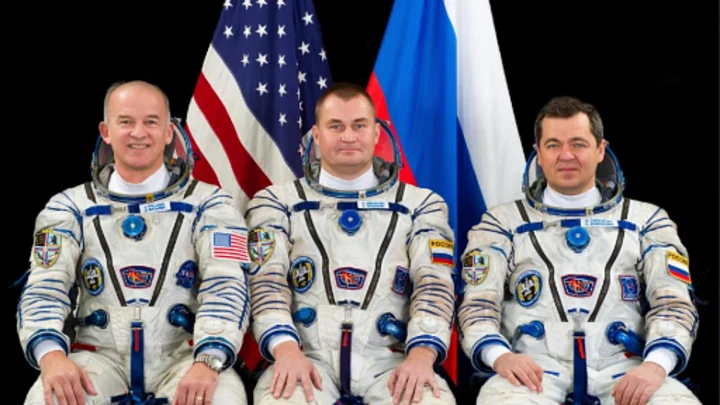After watching more than 2,750 sunrises from above the Earth, three crew members of the International Space Station returned to the planet for a sparkling sunrise Earth Wednesday.
A record-setting American astronaut and his two Russian colleagues felt the sun beat down on them on a cloudless morning after a six-month trek in orbit.
NASA’s Jeff Williams returned as the US record-holder for time in orbit, logging 534 days in space over four missions. Williams, Alexey Ovchinin and Oleg Skripochka logged 72.8 million miles in space, circling the globe 2,752 times before landing on target in the south central steppes of Kazakhstan just 23 minutes after sunrise Wednesday, 7:13 am local time.
Stretched out in chairs placed in the brown wild grass, the three flyers were all smiles, giving thumbs up, chatting on cell phones.
They were promptly pulled out of the Russian Soyuz capsule, which landed on its side, which is not unusual. Williams wore a black baseball cap while seated outside and talking on the phone. Ovchinin clutched a stuffed doll his daughter gave him as a mascot that went into space with him.
They were then carried to a medical tent for routine tests to see how they adjust to gravity, including checking to see how they could stand.
The trio undocked from the space station nearly three-and-a-half hours before touchdown in hazy sunshine with a comfortable welcome home temperature around 66 degrees (19 degrees Celsius) about 90 miles (145 kilometres) southeast of Zhezkazgan in Kazakhstan. They landed thanks to a large orange and white parachute and last second engine firings. NASA spokesman Dan Huot called it a “picturesque landing” on a picture-perfect day.
The three conducted experiments aboard the space station. Williams set the US record last month for most time spent in space. He beat the previous record set by Scott Kelly during his year in orbit. The capsule contained air samples returned from the first inflatable module deployed in orbit.
The world record is held by Russian Gennady Padalka at 879 days in space. Thirteen Russians have more time in space than Williams.
“Everything went very smoothly, very normally,” NASA spokesman Rob Navias said.
(Published in arrangement with AP.)
(At The Quint, we question everything. Play an active role in shaping our journalism by becoming a member today.)
